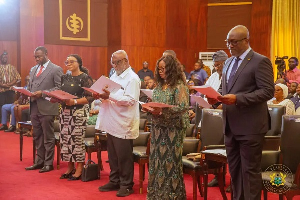In the early hours of most working days (from 5 a.m to 9 a.m), workers in the major cities of our motherland have to endure heavy traffic jams. Many reasons account for the heavy traffic in our major cities: indisciplined drivers, narrow roads and more cars on our roads.
The costs that are associated with traffic are enormous - anxieties resulting from anticipating delays, adverse effect on our environments (air pollution) and livelihoods.
I wake up as early as 4.30 a.m and get ready to hit the road at 5.30 a.m. Due to the traffic jam which starts as early as 5.30 a.m, I stand for close to 45 minutes in wait for a bus. My face is grimaced with a smile after I get the opportunity to board one.
This huge sigh of relief is, however, short-lived when the vehicle comes to an abrupt stop due to the heavy traffic ahead. On average, the 30 minutes journey to work lasts two hours. After a hard day’s work, I heave a sigh of relief at 5 p.m and brace myself for another two hours of unbearable traffic in a return journey home.
I strongly believe this brief account highlights the difficulties workers, students and residents in our metropolis face.
With a burgeoning middle-class and the propensity for families to live in their own houses- in many cases in areas far away from the city centre, this ordeal recounted above is bound to be worse with time.
Apartment buildings have mushroomed throughout Accra, but these magnificent edifices are beyond the pockets of the average Ghanaian family.
This has made it prudent for individuals and families to acquire land and put up structures in places a bit distant from their workplaces.
The Bus Rapid Transit System(BRT)
Many methods and systems have been adopted and implemented to reduce traffic across cities in most countries of the world. Some of the solutions to traffic congestion can be unpopular notwithstanding. Measures usually range from the restriction of driving of only odd or even-numbered cars on specific days to congestion charges.
Wait a minute, the much-touted BRT system is operational on my route, Amasaman to Accra. Can it be called "rapid"? What is the key ingredient in an efficient BRT? I considered one of the pioneering cities of this system, Curitiba in Brazil.
The need arose for an efficient road system for commuters in Curitiba in the 1990s. Existing roads were widened but this approach was later abandoned paving the way for dedicated bus lanes.
Though the system was not an initial success, increasing patronage overtime made Curitiba the city with the highest number of passengers who patronise the BRT system.
Owing to the success of the system, cities in South America, US, Tanzania, South Africa and currently Ghana, have had their fair share of a Bus Rapid System.
For cities that have had a smooth BRT system, the key element has been a clearly dedicated bus lane that does not interfere with the usual traffic flow. I have boarded the SCANIA buses with BRT inscriptions on them a couple of times. A passenger feels at home on the bus.
The payment system eliminates all forms of acrimony that ensues between passengers and conductors. The Aayalolo e-card needs to be acquired to access this bus. A passenger can access a bus ride by showing the card to the entry validator in an outbound bus at a terminal or bus stop. To signal a driver of ones intention to alight, a passenger presses a knob.
Dedicated Lanes
Apart from a few places where a portion of the road is marked out for our BRT, buses compete with other vehicles for space. It is possible for 'trotro' to get to its final destination earlier than our “Rapid Bus”. Intriguing, isn't it? I have witnessed countless times when other commuters have encroached demarcated bus stops.
Bearing in mind the challenge of law enforcement in Ghana and the political-sensitive environment we find ourselves, I doubt if our government has the political will to roll out this efficient and robust system fully.
In my limited view, the BRT in Ghana should be modelled in such a way that the convenience of a passenger who forfeits driving to work to board these buses is not compromised.
While we wait for dedicated lanes, the full roll-out of this system should be followed to the letter as it may hold the magic wand to the reduction of travelling time in the city.
Experts propose that existing informal means of land travel can be integrated into the BRT. Broad consultation and engagement with all stakeholders should be done to forestall any form of resistance.
Opinions of Sunday, 12 November 2017
Columnist: KOBINA ANSAH















